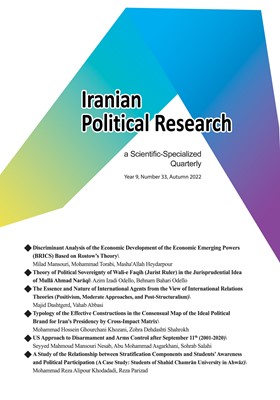Theory of Political Sovereignty of Wali-e Faqih (Jurist Ruler) in the Jurisprudential Idea of Mullā Ahmad Narāqi
Subject Areas : Iranian Political ResearchAzim Izadi Odlo 1 * , Behnam Bahari Odlo 2
1 - Assistant Professor, Department of Education, Sarab Branch, Islamic Azad University, East Azerbaijan, Iran
2 - Assistant Professor, Department of Education, Ardabil Branch, Islamic Azad University, Ardabil, Iran
Keywords: Mullā Ahmad Narāqi, Political Sovereignty, Welāyat-e Faqih, Qajar Dynasty, Wali-e Faqih (Jurist Ruler),
Abstract :
The purpose of the present study is to review the theory of political sovereignty of Wali-e Faqih (jurist ruler) in the jurisprudential idea of Mullā Ahmad Narāqi based on his book 'Avā'ed al-Ayyām. The research method is descriptive-analytic and the results showed that Mullā Ahmad Narāqi is the first jurist who has seriously and fundamentally dealt with the theory of Welāyat-e Faqih and discussed the total authority and power of the jurist during the Age of Absence. Therefore, what distinguishes Narāqi as a unique jurist is his claim and proposal of the theory of Welāyat-e Faqih denoting government and political leadership. Through introducing different aspects of the theory of Welāyat-e Faqih and bringing evidence for them, he has left former jurists and authoritative interpreters of the religious law behind and has revived Shi'ite political theory by giving a special and new manifestation to that. Thus, his perception of the political sovereignty of Wali-e Faqih per se created a new move in the realm of jurisprudence so that Welāyat-e Faqih found a new structure and gradually turned into a dominant and common theory in jurists' discussion about political ideology. Therefore, although the theory of political sovereignty of Wali-e Faqih proposed by Mullā Ahmad Narāqi during the Qajar dynasty was mostly theoretical and idealistic, it turned to be one of the most influential political beliefs in later periods so that the victory of the Islamic Revolution of Iran in 1978 has been the manifestation of that perspective in Shi'ite political jurisprudence.
الگار، حامد (1356). دین و دولت در ایران؛ نقش علماء در دوره قاجاریه. ترجمه ابوالقاسم سری. تهران: انتشارات توس.
بلک، آنتونی (1386). تاریخ اندیشههای سیاسی اسلام: از عصر پیامبر تا امروز. ترجمه محمدحسین وقار. تهران: اطلاعات.
جعفریان، رسول (1387). تاریخ تشیع در ایران از آغاز تا طلوع دولت صفوی. تهران: نشر علم.
حایری، عبدالهادی (1372). نخستین رویارویی اندیشهگرایان ایران با دو رویه تمدن بورژوازی غرب. تهران: امیرکبیر.
خمینی، سید روحالله (1373). ولایت فقیه. تهران: موسسه تنظیم و نشر آثار امام خمینی.
رحمانیان، داریوش (1391). تاریخ تفکر سیاسی در دوره قاجاریه. تهران: دانشگاه پیام نور.
زرگرینژاد، غلامحسین (1373). تحولات اندیشه سیاسی در عصر قاجار. پایاننامه دکتری. تهران: دانشگاه تربیت مدرس.
زرین کوب، عبدالحسین (1363). دنباله جستجو در تصرف ایران. تهران: امیرکبیر.
سیوری، راجر (1379). ایران عصر صفوی. ترجمه کامبیز عزیزی. تهران: نشر مرکز.
فیرحی، داود (1381). دیدگاه فقهی و اندیشه سیاسی فاضل نراقی. آینه پژوهش، 13(1)، ص27-4.
کاظمی موسوی، احمد (1363). زندگی و نقش فقاهتی ملااحمد نراقی. نشر دانش، 4(3)، ص5-9.
کلانتری، ابراهیم (1394). ولایت فقیه: پرسشها و پاسخها. قم: نشر معارف.
مصباح یزدی، محمدتقی (1378). ولایت فقیه و خبرگان. قم: موسسه آموزشی و پژوهشی امام خمینی، ج2.
مهاجرنیا، محسن (1381). اخلاق مدنی در اندیشه سیاسی ملااحمد نراقی. علوم سیاسی، شماره 17، ص66-55.
نراقی، ملااحمد (1331). عوائد الایام. قم: مکتبة بصیری.
نراقی، ملااحمد (1365). حدود ولایت حاکم اسلامی (ترجمه مبحث ولایت فقیه از کتاب عوائد الایام). تهران: وزارت ارشاد اسلامی.
نراقی، ملااحمد (1374). معراج السعادة. قم: هجرت.
نراقی، ملااحمد (1378). حدود ولایت حاکم اسلامی (ترجمه مبحث ولایت فقیه از کتاب عوائد الایام). مرتضی حاجعلیفرد. تهران: نشر کنگره.
نصیری، محمد و همکاران (1394). رهیافت تحلیلی به وصیتنامه سیاسی- الهی امام خمینی. تهران: انتشارات دانشگاه آزاد اسلامی.
_||_

